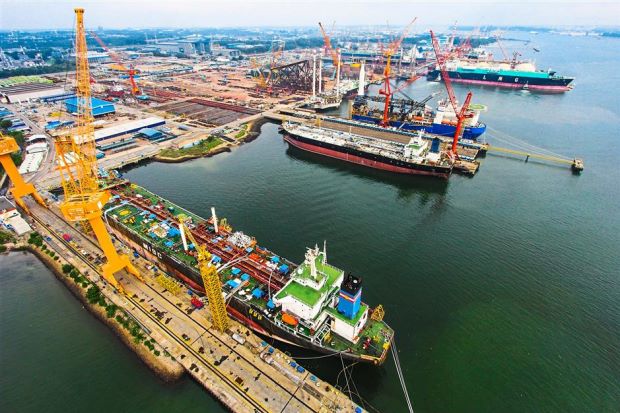THE shipping industry is the faithful, hardly seen, uncomplaining servant of global trade and economy. It is a key component of international trade and many important offshore economic activities. Without ships that carry all kinds of cargo across the world’s oceans, nations would not be able to trade, and globalization as we know it today, where consumers have access to a wide range of goods and materials at reasonable prices, would not be possible.

The industry’s immense role in facilitating the economic growth of Malaysia, which depends on it to carry an estimated 95% of its trade – cannot be overemphasized. Without ships, our products and raw materials would not be able to reach their target markets and we would not be able to have access to all types of materials and goods produced by our trading partners. Key economic activities such as offshore oil and gas exploration and production, fishery, passenger transport and port operations would be halted, and the interests of consumers, businesses, industries and the Government would be severely compromised.
Underscoring the importance of shipping to global trade, the World Maritime Day 2016 celebrated globally last week adopted the theme “Shipping: Indispensable to the World”. Chosen by the International Maritime Organization (IMO), the United Nations body which develops international conventions on shipping, the theme pays homage to the critical role of shipping to not only global trade but modern civilization as well.
Despite its enormous importance, it is a matter of curiosity that the shipping industry does not enjoy the attention or prominence in the public eye the way other transport sectors, namely aviation and automobile, do.
Perhaps it has something to do with the fact that ships are not seen by many except those who live by the coast or in port cities. Unfortunately, shipping tends to be in the media only when something negative occurs, such as collisions, grounding, cargo spillage, drowning of crew or pirate attacks.
Young people do not see shipping as a “sexy” industry or as one that promises exciting career prospects. Blame it on the lack of glamour of working on ships in challenging and at times dangerous circumstances, unconventional working hours and lack of information on the industry.
Although a career in shipping is not for the faint-hearted or the manja type, it certainly has its fair share of excitement and reasonably lucrative career development.
The image or perception of shipping being a challenging career choice poses quite a task for the industry to provide the human capital. As the nation’s trade multiplies and dependence on shipping to facilitate its economic growth increases, and as ships grow bigger and more sophisticated, the need to have adequate, well-trained and highly skilled seafarers rises in tandem. Without the people to operate and maintain them safely, skilfully and efficiently, ships would not be able to undertake their designated tasks.
In this regard, serious efforts must be undertaken by the industry players and other stakeholders such as government agencies, maritime training and education academies and institutes and users of shipping services to ensure that it is served by an adequate number of seafarers and well equipped to meet the demands of the industry. This requires a concerted push and close cooperation among them to provide the hardware (for example teaching academies, simulators and training berths on board ships) and software (such as industry-friendly policies, incentives and capable trainers) to create a facilitating ecosystem for the development of seafarers and the shipping industry as a whole.
It would be a shame if Malaysia fails to address the over-reliance on foreign seafarers and the services of foreign shipping companies, which carry around 90% of the nation’s international trade, as its trade volumes grow and its economic dependence on shipping increases.
It may have eluded the public’s attention that Malaysia’s shipping industry is going through a very critical period amid the global economic recession, slow growth of global trade, drop in oil prices, soft freight rates and overcapacity in shipping trades.
Several shipping companies have had to pack it in while the remaining ones are struggling in a vicious operating landscape that has claimed some high-profile casualties on the international stage such as Korean container giant Hanjin and Singapore-based Swiber.
Shipowners are uncertain how much longer the current downturn in the shipping industry will continue and if they can survive.
In their moment of need, they are hoping the Government could provide some kind of assistance. Some within the industry have suggested the establishment of a fund similar to Danamodal to provide a financial lifeline to shipping companies that are in dire straits to ensure their survival. This was mooted on grounds that Malaysia could not afford to see the further depletion of its national shipping tonnage as seen in the past few years. This was caused mainly by the MISC, Malaysia’s largest shipping company, discontinuing its container trade in 2012, the closure of several local companies and fleet reduction exercise by the surviving ones.
Continued dependence on foreign shipping services would further erode Malaysia’s balance of payment and cause foreign exchange outflow, and would put the nation’s maritime interests in a vulnerable position.
While this may be appealing from the point of view of maintaining national shipping tonnage and preventing the country from slipping further in the international shipping industry stakes, the idea of using public funds to save private entities should be carried out very judiciously.
Although there could well be a compelling case for the Government to step in to protect certain strategic industries such as shipping through policy intervention, such action should not upset the natural equilibrium of market forces and should not protect inefficient shipping companies.
While short-term measures are needed to assist local shipping companies to weather the turbulence, a long-term, strategic approach to develop and boost the growth of the industry should also be in place.
In this regard, the announcement by Transport Minister Datuk Seri Liow Tiong Lai of the impending launch of a Malaysian Shipping Master Plan (MSMP) that provides a roadmap for the growth and development of the industry should be welcomed. The objective of the master plan is to revitalise the shipping industry and maritime sector in Malaysia through structured strategies which include focusing on specific market targets for our shipping companies to penetrate and capitalise on, namely in global energy shipping, intra-Asean trade shipping and the current domestic shipping market.
In undertaking the plan, the MSMP will be aligned with other national plans and agendas including the Shipbuilding and Ship Repair Master Plan jointly formulated by the Association of Marine Industries of Malaysia (Amim) and the Malaysia Industry-Government Group for High Technology (MIGHT) and the study of Malaysia’s port sector led by the Economic Planning Unit (EPU).
Shipping has what it takes to support the national aspiration of generating high income, value-adding activities to realise the objective of the New Economic Model (NEM).
As we celebrate World Maritime Day 2016, stakeholders in the shipping industry must take stock of where the industry has ventured, where it is anchored and where it is setting sail towards. Malaysia has what it takes to become a global player in shipping, as MISC has proven by sailing the Jalur Gemilang proudly in the energy shipping trade.
However, Malaysia needs to leverage on its many advantages such as strategic location along busy shipping routes and in a populous, economically vibrant region; good port and trade infrastructures; abundance of natural resources; trade-oriented economy; and business- and trade-oriented policies to enhance the contribution of the shipping industry to its economy.
Majulah industri perkapalan untuk negara!

NAZERY KHALID
Honorary Secretary
Association of Marine Industries of Malaysia
As published in The Star, 10 October 2016 – http://www.thestar.com.my/opinion/letters/2016/10/10/critical-period-for-shipping/
